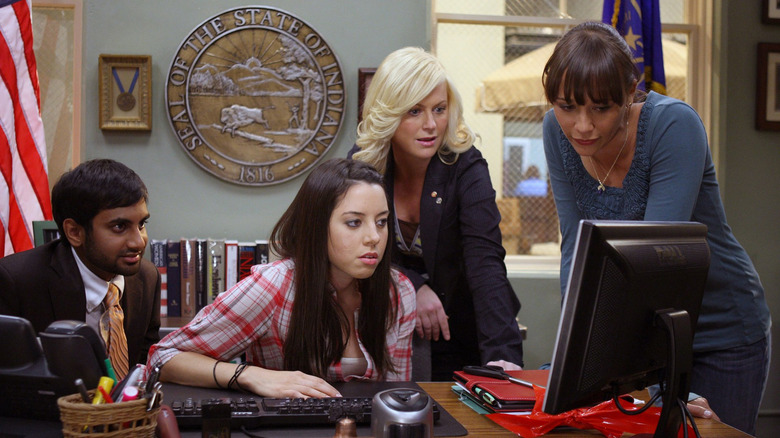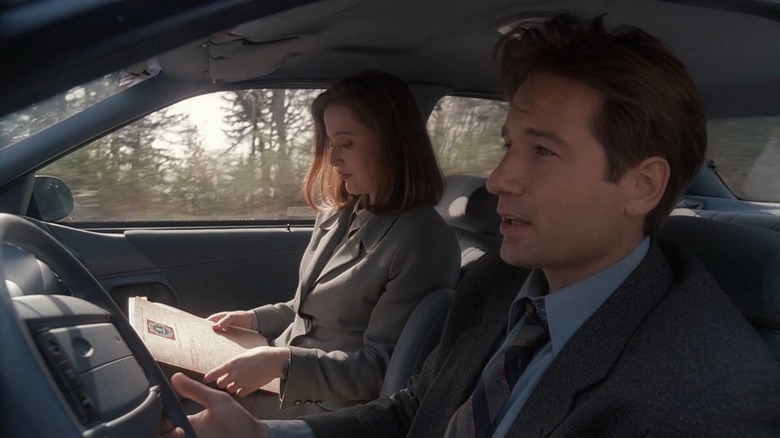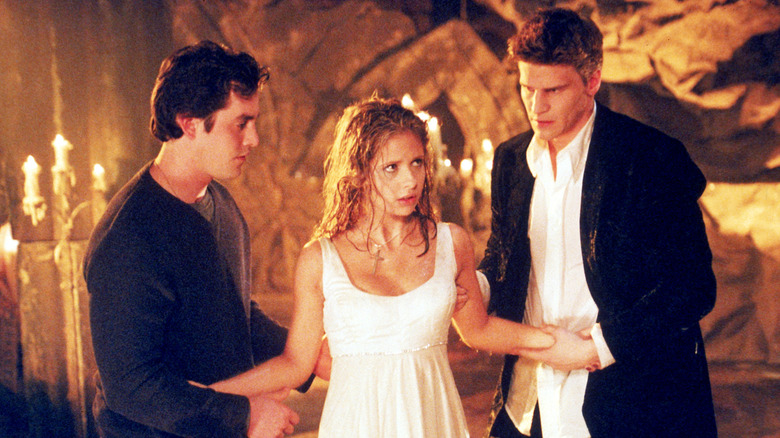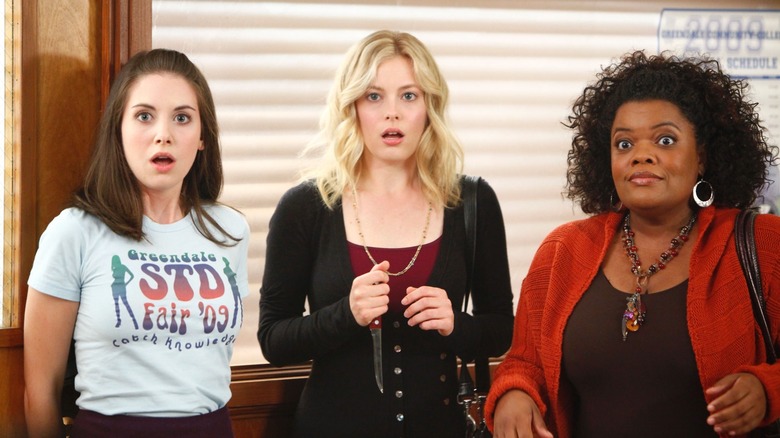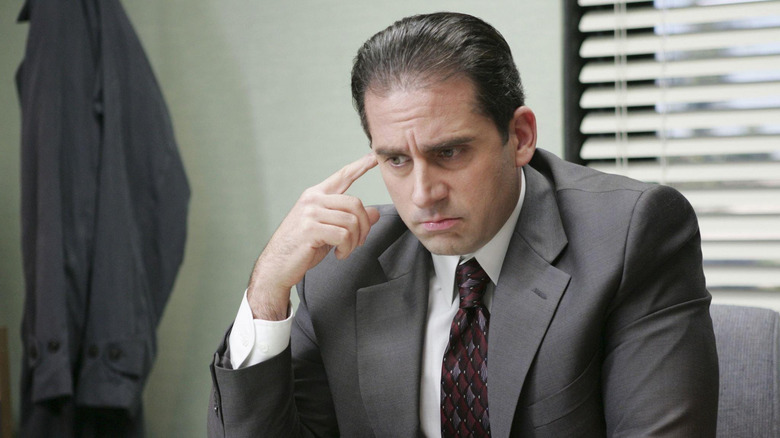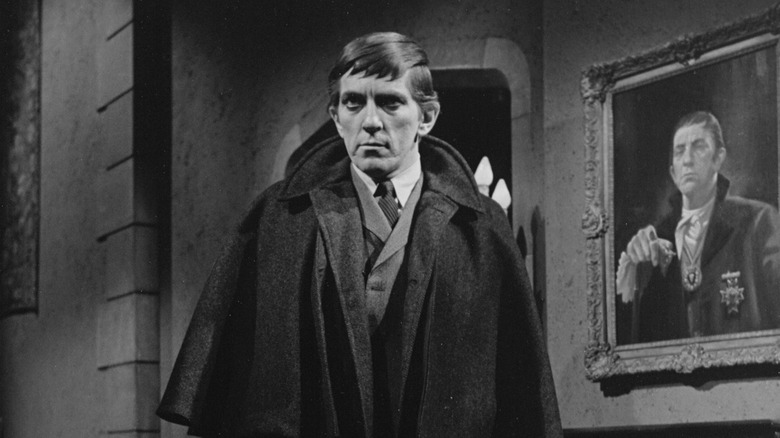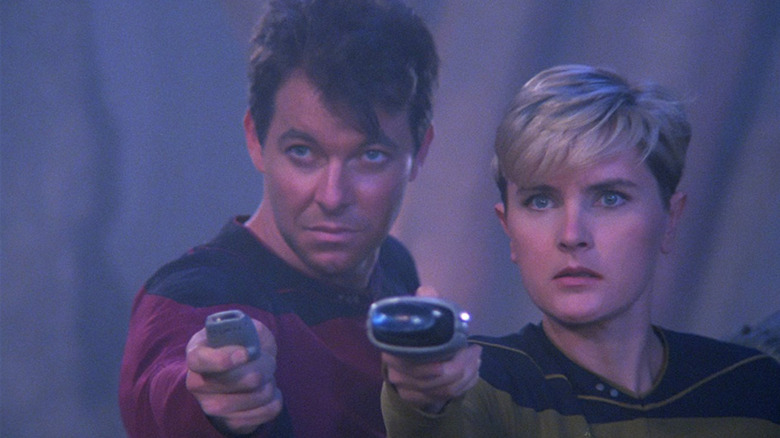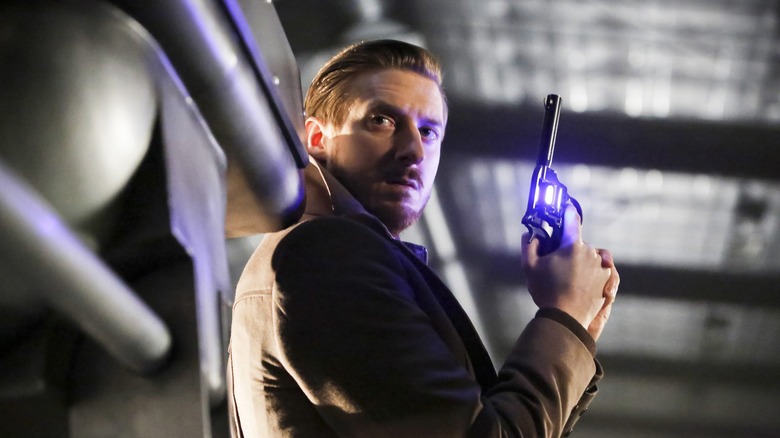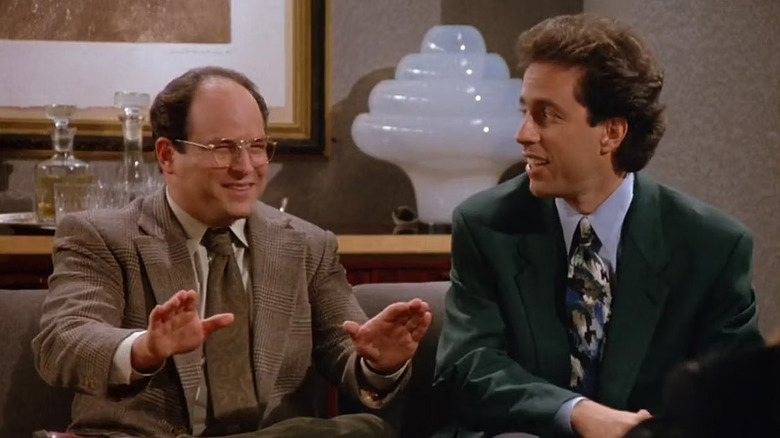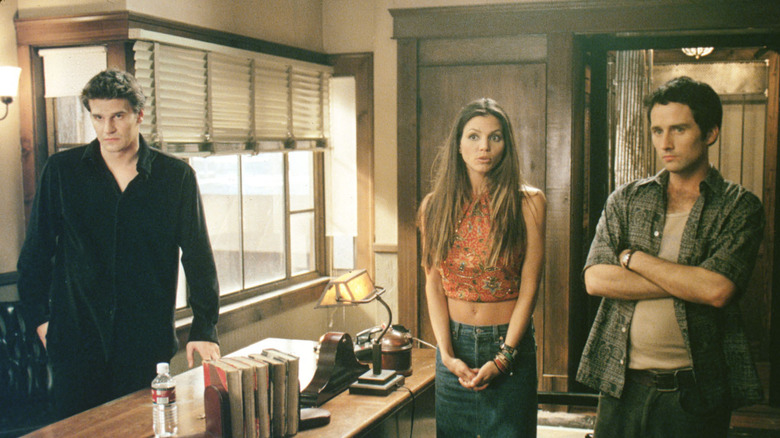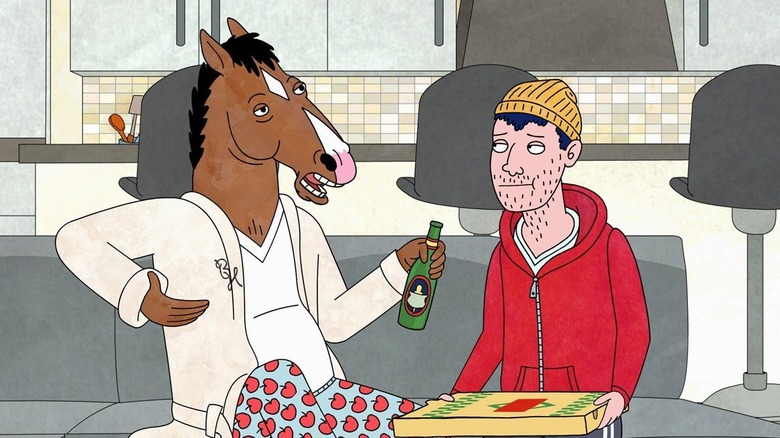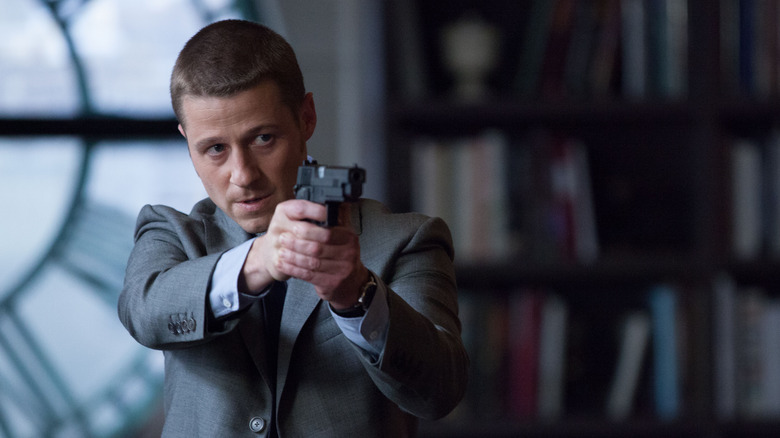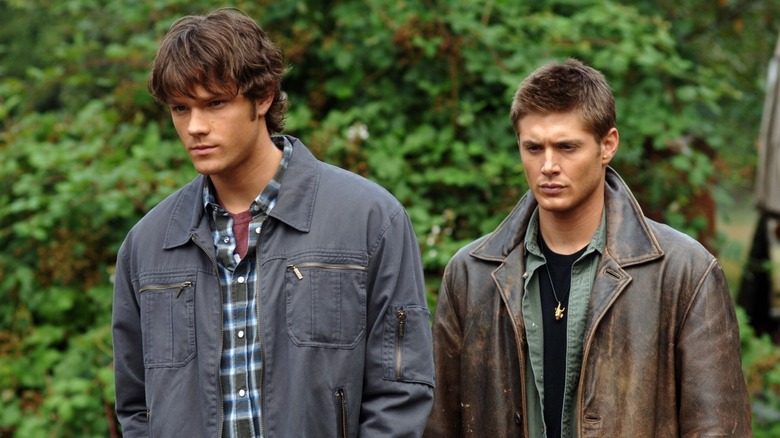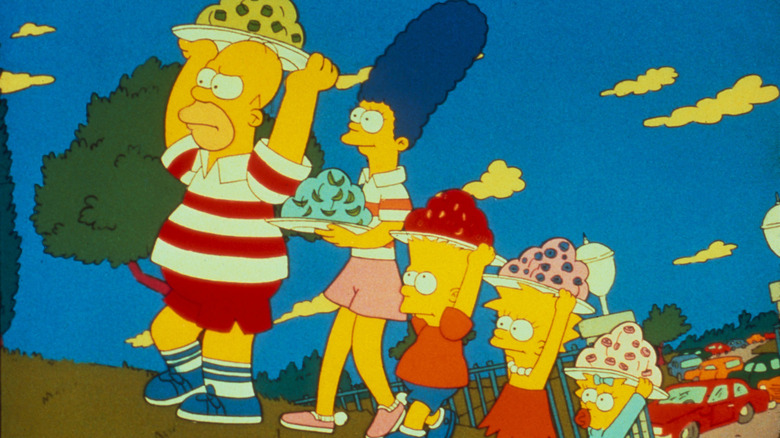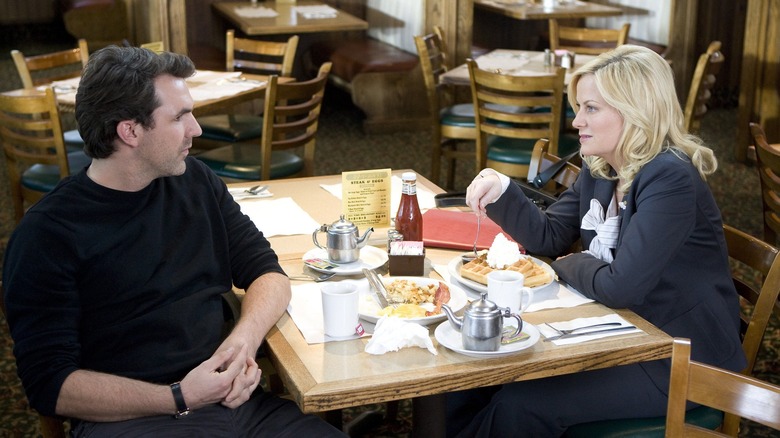Beloved TV Shows With A Rough First Season
Not every TV show can hit a home run right out of the gate. Often, they need time to settle into a routine or win over audiences, especially when they are more character-driven. Normally, things start to shake out after the pilot episode, which is where we usually see the growing pains of a show trying to figure out exactly what it is. But every once in a while, there's a show — sometimes even one that will go on to become legitimately great — that needs a little more hand-holding.
Maybe the characters aren't gelling the right way, the showrunners are attempting to retool the series in real time, or they were simply experimenting stylistically. Whatever the reason, it's not impossible for a show that requires some extra time to cook to become beloved by audience. Here are some of our favorite shows that, despite eventually aspiring to greatness, had serious wobbles in their first season, for one reason or another.
The X-Files
If you've seen "The X-Files" (and at this point, if you haven't, what's your excuse?), you know that a huge part of the show's success is the incredible chemistry between David Duchovny (Mulder) and Gillian Anderson (Scully), who didn't want to just be a female sidekick. The classic example of opposites attracting, their will-they-won't-they relationship set TV screens aflame for most of the popular sci-fi series' run. But not so much during the first season, when they were more focused on building out the mechanics of this unexplained phenomenon of the week format.
Part of this is because the creators of "The X-Files" probably didn't expect Fox and Mulder to become a cultural touchpoint in terms of on-screen romances, but also because, in a lot of ways, they were inventing a new subgenre of television. There hadn't been a lot of science-fiction procedurals up until that point, so it makes sense that the first season would be devoted to figuring out what that looked like. Considering that, and the fact that "The X-Files" went on to be one of the most popular series of all time, we suppose we can forgive minor mistakes in the beginning.
Buffy the Vampire Slayer
For some audiences, "Buffy the Vampire Slayer" was a hit from its very first scene, when it subverts traditional horror movie expectations by having a teenage boy and girl sneak into a high school at night, only to reveal that the girl is a vampire luring the boy into a trap rather than the other way around. But if we look at the iconic teen horror show objectively, there are a lot of weak points in its first season, and the character being named Buffy isn't one of them, despite what the network thought.
The show's efforts to use monsters as a metaphor for teen issues are less nuanced than many we see later in the show's run (if we're discounting season 4's "Beer Bad," that is), and season 1 has a disappointing ratio of hits to misses in its monster-of-the-week formula. Episodes like "The Pack," for example, are not only mediocre from an entertainment standpoint, but haven't aged particularly well in how it deals with date rape culture and its clumsy depiction of animistic religions. But season 1 isn't a total wash, because there are plenty of bright spots, and by the season finale, the '90s classic is firing on all cylinders.
Community
Although "Community" has a lot of die-hard fans, it also had a fairly turbulent series run. Between bouncing around different networks, losing cast members to controversy, showrunners playing a dramatic game of musical chairs with creator Dan Harmon leaving before the fourth season and then returning for the fifth, it faced more than its fair share of difficulties. But as far as the first season goes, its issues are pretty simple: It's just a matter of a show that doesn't quite know what its greatest strengths are.
"Community" makes the mistake of thinking that Jeff (Joel McHale) is the star of the show, and it devotes a lot of attention to his exploits before turning the show into a true ensemble comedy. In a similar vein, "Community" hadn't yet figured out what to do with, arguably, its two biggest breakout performers: Alison Brie as Annie and Donald Glover as Troy. Especially at the beginning of the series, it clings a bit too tightly to their high school character archetypes.
But like all good shows, "Community" knows how to get out of the way when magic is happening. By the end of the first season, its main characters have become more like the versions we know and love, and some of the more successful comedy pairings are getting a greater share of screen time. (They're still trying to figure out how to make Chevy Chase's Pierce work, but you can't have everything.)
The Office
In the United Kingdom, Ricky Gervais's white-collar comedy "The Office" was a massive hit, so it was only a matter of time before it crossed the pond for an American reboot. But the success of the British version was, ironically enough, a huge part of why its American counterpart had a seemingly doomed first season to begin with. At first, the series tried too hard to recreate the energy of the original series, which tended much more towards often mean-spirited cringe comedy. The British version of "The Office" worked in part because Ricky Gervais had the perfect presence as a smug boss with an inherently punchable face, but Steve Carrell brought something very different to the role of Michael Scott, and the writers and producers had to figure out how to tap into that.
As the first season of the show went by, it became clear that replicating the British sense of humor wasn't the right choice. Instead, Carrell's Michael Scott evolved into a well-intentioned but oblivious office manager, someone audiences became emotionally attached to in spite of his frequently problematic and misguided quirks. As his character solidified — and the many other supporting roles on the show came into focus — the American version of "The Office" came into its own, ultimately staying on the air for nine seasons and cementing its legacy as a top-tier comedy in its own right.
Dark Shadows
"Dark Shadows" began life as a moody, atmospheric soap opera set in a foreboding manor house, revolving around the mysterious Collins family. That's what it was from the very start, and although it displayed a lot of potential during its first season, it was teetering on the verge of cancelation. It was then that the showrunners followed the tried and true method of saving a show on the rocks: When all else fails, have a vampire show up. (Okay, so this isn't an established technique, but it probably should be.) Barnabas Collins (Jonathan Frid) made his debut in the second season, and the rest is history.
Barnabas was the Collins' vampiric patriarch who returned to his family estate in Maine, establishing a charismatic and malevolent presence immediately while also opening a door for "Dark Shadows" to embrace the supernatural in other aspects of its storytelling. While pre-Barnabas "Dark Shadows" is enjoyable campy fun, Barnabas turns it into a phenomenon, one that crucially attracted a burgeoning teenage demographic and created legions of high school girls sprinting home from school en masse to tune in. But the big screen adaptation with Johnny Depp didn't make the same impression.
Star Trek: The Next Generation
With such a legacy behind them, it stands to reason that each new iteration of "Star Trek" takes a little bit of time to get its sea legs, to establish itself as a separate entity from what came before. "Star Trek: The Next Generation" moves away from the familiar characters of the 1960s science fiction series, building a narrative around a new Starfleet ship nearly 100 years in the future. As a result, audiences didn't have Captain Kirk or Dr. Spock to cling to, and for the first time, they'd have to embrace an entirely new cast in the "Star Trek" universe. Things began a little bumpily.
First of all, there was a tug-of-war going on behind the scenes between original "Star Trek" showrunner Gene Roddenberry and several of the show's writers, creating a constant upheaval of creative talent (especially when it came to revamping Romulans) that hardly made for a narratively coherent first season. (The documentary "Chaos on the Bridge" offers an inside look at all of the on-set drama, if you're interested in learning more.) Additionally, many of its storylines felt like little more than microwaved leftovers from the original series, retrofitted for the new cast of characters. But despite all this, it found a way to resolve its issues, and is now regarded as one of the best of the many "Star Trek" spinoff shows.
DC's Legends of Tomorrow
About a decade ago, The CW simply could not stop making DC comic book-inspired television series, resulting in an "Arrowverse" that was beloved during its television run. Some were extremely popular (both "Arrow" and "The Flash" had impressive runs and devoted fanbases), while others were canceled after just a few seasons. "DC's Legends of Tomorrow" fell somewhere in the middle — after a shaky start, it pulled things together and went on to air for seven seasons on the network.
The show revolves around Rip Hunter (Arthur Darvill), a time-traveler who journeys to the present day and assembles a group of superheroes in an attempt to circumvent the cataclysmic devastation that unfolds in the future. Some are characters we're familiar with from other shows, like Sara Lance from "Arrow," while others are less well-known. But although it features an interesting concept and a great cast, "Legends of Tomorrow" suffered from an identity crisis in the first season. It's tonally uneven, and often feels as though it's simply mimicking its older and more successful DC brothers on The CW rather than creating something of its own. After "Legends of Tomorrow's" comparatively weak first season, however, the second and third seasons represent some of the best that superhero TV has to offer.
Seinfeld
When you watch the divisive early episodes of "Seinfeld," it's hard to believe that you're watching the same show that became one of the most iconic comedies of the 1990s. Sure, the seeds that would grow into Larry David's mighty irreverent oak tree are there, but it's also very much a comedy that's figuring out how to structure itself, especially in the pilot. There's no Elaine, Kramer is called Kessler, the characters don't eat at the classic Monk's Cafe — it's complete bedlam. And what's more, the first season only lasted five episodes, hardly enough to really establish itself, especially since this show was famously about nothing.
"Seinfeld" simply needed more time to nail down its format, something essential for a sitcom as apparently freeform and experimental as this. Certainly, it would take more than five episodes for the four central characters of the show — Jerry Seinfeld, George Costanza (Jason Alexander), Kramer (Michael Richards), and Elaine (Julia Louis-Dreyfus) — to develop the tight-knit interpersonal dynamics that kept audiences tuning in to watch their shenanigans week after week.
Angel
"Buffy the Vampire Slayer" had been on the air for a handful of years, winning over young audiences left and right, before the decision was made to spin off one of its most popular characters. At the end of season 3, after Buffy graduated high school (killing the Mayor and destroying Sunnydale High in the process, but who's keeping track?), her on-again-off-again vampire boyfriend Angel (David Boreanaz) would depart for Los Angeles to have his own undead adventures. Unlike Buffy, Angel was no spring chicken. He had a long life. A dark past. Experience. So it seemed that the intention of "Angel" was to provide a more mature, edgier counterpart to "Buffy the Vampire Slayer," even though the introduction of the character had Joss Whedon breaking his own rules.
Initially, "Angel" struggled with self-seriousness so much that, at times, it wasn't clear how the show could actually move past it. Although Doyle (Glenn Quinn), a half-demon with the gift (or curse, as it were) of visions, was a delightful character, the show didn't really come into its own until Wesley became cemented as the third member of the central trio. More specifically, once he shed his uptight Watcher persona and morphed into a still bookish but much more likable version of the character.
Bojack Horseman
Although "Bojack Horseman" appeared at first glance to be little more than a foul-mouthed animated series aiming for cheap laughs about a washed-up sitcom star (who, yes, happens to be an anthropomorphic horse), the show quickly tapped into hidden depths. There are standout episodes about depression, lobotomies, grief, and self-hatred that tap into dark and uncomfortable feelings in a way that lingers in the viewer's subconscious. Audiences might be surprised at how well "Bojack" articulates mature and complicated emotions while still having a sense of humor, but that unexpected emotional resonance is part of what made the Netflix series so special.
However, takes a while for "Bojack Horseman" to get to the pathos. In the beginning, it leans hard into a more conventional "adult animation" style of humor, presumably to avoid trauma dumping all over the audience right away. It spends too much time focusing on Bojack's crush on his ghostwriter Diane (Alison Brie) and gives only flickers of the brilliance that the show's best episodes fully showcase.
Gotham
We've spent a lot of time watching Batman as an adult superhero attempting to save the city of Gotham from itself. So why not turn back the clock and watch Bruce Wayne as a little rich kid growing up in Gotham? For once, why not just focus on the scene where his parents are murdered in a robbery attempt? "Gotham" does just that. Centering around Jim Gordon (played by Ben McKenzie of "The OC" fame) as a young detective trying to work around the blatant corruption of the city, the show weaves threads between him, a young, recently orphaned Bruce Wayne (David Mazouz), and Gotham's various villains.
Don't get us wrong, the first season of "Gotham" isn't downright bad. But it's much more of a straightforward police procedural that just happens to take place in the world of "Batman." It's only later that it reaches its full potential, blending the inherent kookiness of Batman's famous Rogues Gallery with a more hard-boiled detective narrative. If you're going to make a show set in Gotham, you might as well make it feel like Gotham, ya know?
Supernatural
For long-time fans of "Supernatural," it can be kind of funny to go back and re-watch the first season, where Sam and Dean Winchester (Jared Padalecki and Jenson Ackles, respectively) have finally started working in the family business of demon-hunting after years of internalized resentment. First of all, their voices are like an octave and a half higher, presumably reflecting the characters' comparative lightness before all the world problems begin to weigh down their broody vocal cords.
But more importantly, it shows how much the long-running show has changed over the years — gone are the season-long arcs and battles between literal angels and demons, and in their place are less serialized monster-of-the-week storylines. Sure, they're still fun to watch (and some are legitimately terrifying), but "Supernatural" doesn't become the show that ran for a mind-boggling 15 seasons until it moves away from this type of storytelling and embraces something more epic in scale. "Supernatural" is enjoyable with its ghosties and goblins and daddy issues, but the larger apocalyptic arcs are what will cement its legacy. Also, if you're going to watch the first season of "Supernatural," make sure to do it on DVD instead of streaming.
The Simpsons
There's no beating around the bush: The first season of "The Simpsons" is legitimately scary. Having started as a short series on "The Tracey Ullman Show" (one that Ullman herself reportedly hated), the animation style during its first season was — well, let's just say it was working out the kinks. It's like watching an uncanny valley version of "The Simpsons" — they're definitely recognizable as the Simpsons, but they're just off enough to make them extremely unsettling to behold.
Furthermore, it's clear that the writers were still figuring out the family dynamics between the main characters. In its earliest season, Homer is far from the genial if dim-witted patriarch we know, and he's much more of a brute, especially in his interactions with Bart. Speaking of Bart ... the first season is obsessed with him. Don't get us wrong, there are plenty of great Bart-centric episodes, but there's also a lot of material to mine with the other members of the Simpson family. Maybe they were right, considering how Bartmania swept America in the early '90s, but we're sure none of this was helping Lisa's middle-child complex.
Parks and Recreation
Back when "Parks and Recreation" first came out, it was designed as a spiritual successor to the immensely popular "The Office." The NBC series initially leans heavily into the fly-on-a-wall mockumentary style of "The Office," and it makes its star Leslie Knope (Amy Poehler) into little more than a female version of Michael Scott. She's extremely passionate about local politics but doesn't come across as too bright, which is in shocking contrast to the hyper-competency she showcases in later seasons. It also devotes a lot of screentime to her infatuation with Mark Brendanawicz (Paul Schneider), who, no offense intended, is the television version of an unbuttered slice of white toast. So it should come as a shock to no one that there are plenty of "Parks and Recreation" fans who recommend skipping the first season entirely.
Luckily, "Parks and Recreation" accepted the notes from critics and made a massive restructure before the second season. The result is a series that isn't just a carbon copy of "The Office," but stands on its own two feet like a proud Pawnee Goddess. If the price to pay for the show's upgrade is that Mark unceremoniously disappears from Pawnee, well, we're willing to take that bargain. Oh, Mark Brendanawicz, we hardly knew ye.
